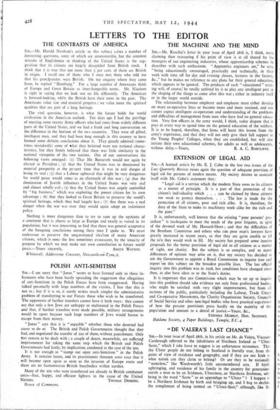LETTERS TO THE EDITOR
SIR,—Mr. Harold Nicolson's article on this subject raises a number of interesting questions, some of which are unanswerable, but the common mistake of Englishmen in thinking of the United States is the sup- position that its citizens are largely descended from British stock. I think that it is true that not more than 5 per cent. of them are British in origin. I recall one of them who I once met there who told me that his grandparents were British. On my enquiry where they came from, he replied " Hamburg." For a large number of Americans think of Europe and Great Britain as interchangeable terms. Mr. Nicolson is right in saying that we look out on life differently. The American is forward-looking, while the British have their roots in the past. The Americans value size and material progress ; we value more the spiritual qualities that are part of a long heritage.
The vital question, however, is what the future holds for world civilisation in the American outlook. Ten days ago I had the privilege of meeting some twenty Army officers who had come from widely different parts of the United States, and we had a frank and long conversation on the difference in the horizon of the two countries. They were all gifted, intelligent men, and they had been long enough in this country to have formed some definite conclusions about it. They greatly admired (some- times mistakenly) some of what they believed were our national charac- teristics, but they firmly believed that there was little similarity in the national viewpoint of the two nations. Out of our conversations the following views emerged: (t) That Mr. Roosevelt would not again he elected as President ; (2) that the United States was so dominated by material prosperity at the present time that it was in real danger of losing its soul ; (3) that a Labour upheaval that might be very dangerous for world peace would come as an aftermath of this war ; (4) that the domination of Jewish influences in the United States was very real and almost wholly evil ; (5) that the United States was largely controlled by " big business," which was exploiting the poorer citizen for its own advantage ; (6) that they looked to Great Britain to preserve the world's spiritual heritage, which they had largely lost ; (7) that there was a real danger when the war was over they would again adopt an isolationist policy.
Nothing is more dangerous than to try to sum up the opinions of a continent that is almost as large as Europe and nearly as varied in its population, but it was interesting to find that there was general acceptance of the foregoing conclusions among these men I spoke to. We must endeavour to preserve the unquestioned idealism of many American citizens, which• is none the less sometimes evanescent, by the tenacity of purpose by which we may make our own contribution to future world


























 Previous page
Previous page